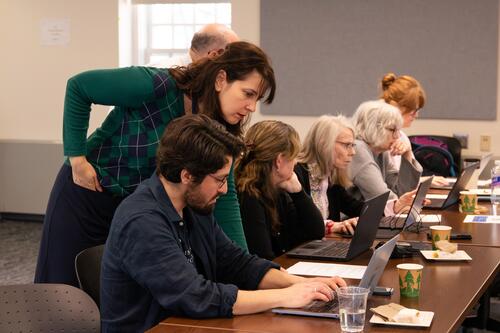
Yale Library and Poorvu Center collaborate on AI literacy framework for faculty
Artificial intelligence (AI) applications—like Clarity, ChatGPT, and others—can be valuable tools for both students and faculty. In keeping with Yale University’s five-year commitment to support campus-wide engagement with AI, Yale Library is steadily increasing its efforts to promote the effective and ethical use of AI tools for research, teaching, and learning.
As part of that effort, the library has collaborated with the Yale Poorvu Center for Teaching and Learning in the development of a literacy framework to assist faculty in successfully employing Generative Artificial Intelligence (GAI) in the classroom.
The fundamental guidance provided in the “Generative Artificial Intelligence (GAI) Literacy Framework” is intended to help faculty members design their courses and assignments and guide their students in the use of the technology. The framework identifies four aspects of GAI literacy to assist faculty members in scaffolding student instruction: understanding, using, evaluating, and analyzing.
“Students and faculty are currently at very different places in their understanding of and comfort levels with GAI,” said Julie McGurk, the Poorvu Center’s director of Teaching Development and Initiatives. “I hope this framework will help instructors consider the various aspects of GAI that students need to understand in order to better decide when, how, and if they should engage with GAI to support their learning and intellectual work in a specific course and future work.”
GAI is a form of artificial intelligence that produces text, images, and other media. It allows users to generate summarizations of texts, retrieve entities and concepts from a range of materials, and query syllabi and other documents. As stated in the GAI Literacy Framework, “effective use of GAI in a course can help students reflect on their own knowledge development, a practice shown to improve learning outcomes.”
“Libraries have always worked to support literacy, including digital literacy,” said Lauren Di Monte, associate university librarian for Research and Learning. “We hope this framework will make it easier for instructors to develop assignments and course activities that will help students become savvy, empowered users of GAI tools.”
Both Yale Library and the Poorvu Center for Teaching and Learning offer support to instructors interested in incorporating GAI into their courses. For pedagogical support, please contact the Poorvu Center. To learn more about the GAI Literacy Framework and GAI tools, please contact Digital Humanities Developer Gavi Levy Haskell at Yale Library.
Read the complete document, “Generative Artificial Intelligence (GAI) Literacy Framework.”
Learn more about Yale Library AI Initiatives and Yale University’s AI initiatives.
Learn more about the Poorvu Center’s AI guidance for teachers and Yale’s GAI tools for faculty, students, and staff.
—Deborah Cannarella
